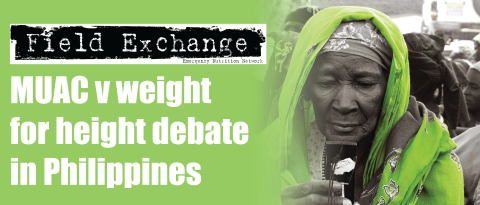Minimum Reporting Package (MRP) on Supplementary Feeding Programmes
In order to evaluate the quality and impact of nutrition interventions, agencies need effective monitoring and reporting systems in place for programmes. A retrospective analysis of emergency supplementary feeding programmes (SFPs) published in 2008 by the Emergency Nutrition Network (ENN)1 highlighted inadequate reporting standards and raised concerns over the quality of the interventions themselves. Based on the study’s recommendation and funded by the US Office for Disaster Assistance (OFDA), the ENN together with Save the Children UK (SC UK), led the development of a monitoring and reporting guidelines and software, guided by a steering group of interested agencies. This Minimum Reporting Package (MRP) for SFPs was subsequently piloted in four countries2. A new phase of rollout has now begun, funded by ECHO and led by SC UK. Initiated in the second half of 2011, this 18 month project will see MRP rollout with approximately ten ECHO implementing partners and involving up to 30 SFPs. An additional module to integrate reporting for severe acute malnutrition (SAM) programmes is also being developed to facilitate reporting where both SFP and SAM treatment are managed under one intervention.
The overall goal of the MRP is to improve monitoring of the performance of SFPs implemented by NGOs and WFP (and WFP partners where relevant), to enhance programme management and agency accountability. Given the different capacities of implementing agencies and contexts within which they work, the MRP has been configured for two levels of usage: essential reporting (adhering to Sphere Standards) for basic users and optional advanced reporting for agencies requiring more information. The MRP also allows reporting on programme characteristics (e.g. specific country/area/ programme context) and population- based statistics (e.g. coverage and malnutrition rates) to aid interpretation of programme performance indicators. Field implementation can be tailored to each organisation’s capacity, adapting to context-specific challenges in communication and staff training, including allowing for MRP use in systems that are mainly paper-based at field level.
A further goal of the ECHO MRP project is to improve understanding of the overall efficacy and effectiveness of SFPs through conducting a final analysis of the performance data of all programmes utilising the package during the project period.
Specific MRP objectives are:
- to provide guidance for reporting monitoring information from SFPs by providing standardised criteria and a standardised reporting system
- to facilitate the process of reporting by providing standard data collection tools and a user-friendly database
- to promote quality improvement and lessons learning in SFPs through realtime reporting of programme statistics and data comparisons within agency programmes, as well as across agencies as appropriate
The MRP includes:
- MRP guidelines with standard definitions of variables and indicators (includes SAM for practical use by agencies required to report on both SAM and moderate acute malnutrition (MAM))
- Software/database (the ‘eMRP’)
- eMRP database user manual (step-bystep guide)
- Data collection forms
Key expected benefits of the MRP are
- Increased timely monitoring and reporting capacity of implementing partners and thus higher quality performance and impact
- Enhanced accountability to beneficiaries and donors
- Facilitation of programme supervision and cross programme/agency comparisons
- Lessons learned through an end-ofproject analysis

The MRP project will continue to be supported throughout 2012 by a team of four SCUK staff along with advisors and consultants. Moving forward, the team will provide training, mentoring, and realtime support as needed to agencies using the MRP, including a helpdesk and monthly report feedback.
Although this 18-month project necessarily has short-term goals, the MRP could have longer term, more sustainable applications. It is foreseen that MRP use and application by agencies will continue after the ECHO project ends in December 2012.
For further information, please contact Jennifer Martin, email: j.martin@savethechildren.org.uk.
1Measuring the Effectiveness of Supplementary Feeding Programmes in Emergencies, Carlos Navarro-Colorado, Frances Mason and Jeremy Shoham, Humanitarian Practice Network Paper 63, September 2008. ODI
2Download report at: http://www.ennonline.net/pool/files/research/mrp-report-final.pdf
Imported from FEX website


